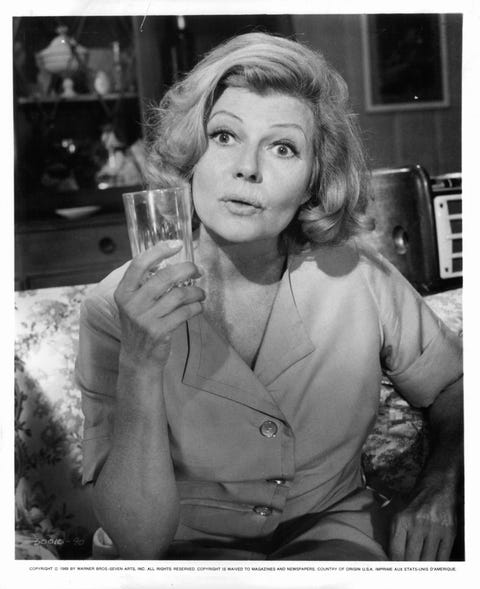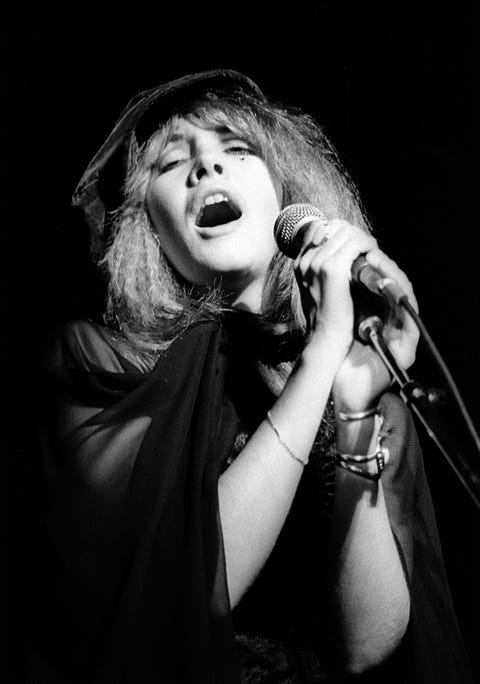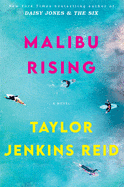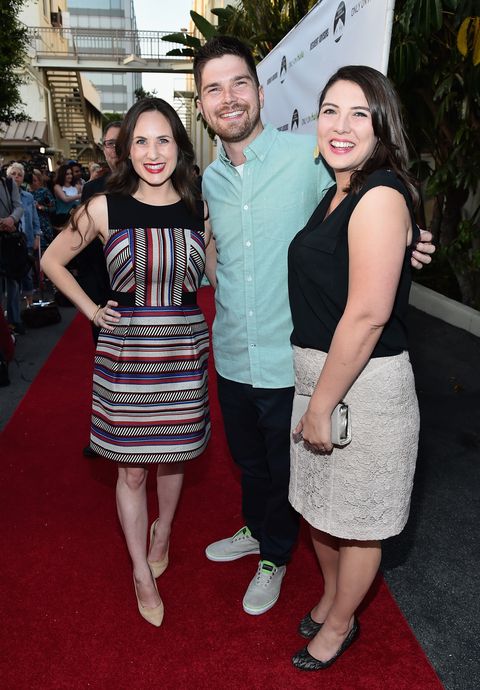In Taylor Jenkins Reid’s version of American mythology, the stories all start in California. That’s why she’s here now, lounging on her Los Angeles porch in a white T-shirt and sunglasses, relishing her private oasis of warm breezes and copious sunshine. A rooster crows from the neighboring yard as a cement truck bumbles by. She grins at this, aware of the irony.
The bestselling novelist who wrote Daisy Jones and The Six and now, Malibu Rising, out this week from Ballantine Books, Reid had every opportunity to build another Mount Olympus in her mind. She was born in eastern Maryland and raised in Massachusetts, a breeding ground for American legends, from the first steps on Plymouth Rock to Paul Revere’s ride. But she wasn’t interested in how scholars and politicians warped the past to create new chapters in our history books. From the age of 10, Reid’s attention was turned toward a more contemporary form of myth-making—the glory and catastrophe of American celebrity. To examine that phenomenon, there was only one place to go.
“I couldn’t have articulated for you why I had to go [to Hollywood],” she tells me over a long Zoom conversation. “I think part of it, honestly, was this fictional promise of California. The sunshine and the glamorous people and the movie stars—it really called to me. But it took me a long time to figure out what I wanted to do in that space.”
She’s been in Los Angeles for 16 years now but she first moved there at the age of 21, after earning her film and television degree from Emerson College. Her first weekend in the city, she clocked out at 5 p.m. and realized she had no idea what to do with herself. L.A. was a sprawling, sunlit ravine where she knew no one, so she did what any young person who moves to the big city with a dream does: bounce around and wait for something to happen. After several years in casting, a brief stint in entertainment tech, and a few delirious moments considering a career in television writing, she realized her L.A. story revolved around its wilder characters—and she wanted to create them herself. It would be less messy that way, and she could know them the way she could never know a true star.
So much of Hollywood is smoke and mirrors, and Reid wanted to know what happened before the special effects put a pretty frame around the picture. “I’ve always been like, what happens before you get to production?” she says. “How do you choose who the people are? Who’s writing it? What is the story idea? What’s the development of that? And that’s when I finally realized, well, what I want to do is tell stories. I want to spend a lot of time thinking about who these people are that the story is about.”
It’s easy to recognize that line of thinking if you’re read Reid’s recent work, like Daisy Jones or the equally glittering 2017 novel The Seven Husbands of Evelyn Hugo, in which an aging Hollywood starlet, á la Elizabeth Taylor or Rita Hayworth, recounts how she met her seven spouses and the one great love of her life, a woman named Celia St. James. But those who’ve yet to plunge into Reid’s earlier novels might be surprised to find they’re a 180 from the celebrity-focused stories that made her a New York Times bestselling author and household name among the literary-minded.
Reid launched her career with conventional romance; her first book, Forever, Interrupted, was a rough-around-the-edges but resonant tale of a Los Angeles librarian who meets the love of her life, marries him within weeks, and loses him days after their wedding. (He gets into a tragic bike accident while on an errand to fetch her Fruity Pebbles.) It’s sweet and sad and all the things you expect from a tearjerker, with the exception of one short section. The protagonist, Elsie, travels to her mother-in-law’s lavish home in Newport for a bit of what she calls “Widow Rehab.” The ensuing pages are packed with pool lounging, gallons of iced tea, and some of the book’s most powerful lines, many of them coming from Susan, Elsie’s mother-in-law. Though she’s not a celebrity, Susan’s the first glimmer of an Evelyn Hugo or Daisy Jones-like character in Reid’s work, a woman who has steeled herself from harsh realities with charisma, talent, or seclusion—or some combination of all three—and a lot of money. You can tell this concept drew Reid in like a moth to light.
She went on to write three more contemporary romances before her dramatic departure from the genre with Evelyn Hugo. The book didn’t make her famous, but it captured an audience none of her prior works had.
So, why stray from modern-day romance to Old Hollywood? “I’m writing what I’m interested in, and what I’m interested in changes,” Reid says. “Once I finished those first four books, I felt like, ‘Okay, I understand structure more, I understand character more, I feel more in command of my voice. So let’s fuck shit up.’”
Evelyn Hugo was not an overnight success—it only reached the New York Times bestseller list this year, in fact—but it did prove to Reid’s readers, and to herself, that she could spin legends of Hollywood with authority, with a keen eye that celebrated the joyful debauchery of L.A. without letting its more lecherous characters off the hook. She could make a sexpot like Evelyn equal parts hero and villain, the auspices of fame a shroud around her insecurities. She could paint a bygone era in neon colors and make the ‘50s and ‘60s of a fictional novel feel more like documentary. Her writing had sharpened significantly since her time in Romance Land. She was ready for her hit.
Or, rather, she was ready to work on her hit. Evelyn Hugo brought a shift in her content. Daisy Jones brought a shift in her process.
“Hollywood gossip is sort of a lifelong hobby of mine,” Reid says. “I already knew who Rita Hayworth was, I already knew the bones of that story. When I started Daisy Jones, I thought, well, I’ll just write about fame again. And then I sat down and I was like, ‘I have no idea what I’m talking about.’”
She wanted Daisy Jones to be a loose recreation of the Stevie Nicks we think we know—a ‘70s rocker with a raw talent whose dramatic highs and lows on the road would lend her an air of legend for decades to come. Daisy would have “dark, cobalt blue” eyes and “copper-red hair,” “an incredible voice that she doesn’t cultivate,” and “all the money in the world, access to whatever she wants—artists, drugs, clubs—anything and everything at her disposal.” Perhaps most importantly, she would have an album and a song that encapsulated both the era and Daisy’s singular brand of magnetism: Aurora.
The problem was, Reid knew little about ‘70s rock and had no technical understanding of music. She’d never written songs before, and now she was tasked with writing an entire booklet of supposedly famous, critically beloved lyrics. She wanted to write Daisy Jones as an oral history but had never tried one before. So she read them. She left Fleetwood Mac’s Rumours on endless repeat, as well as Nicks, Lindsey Buckingham, and Bruce Springsteen, and she read gossip columns and history books and watched MTV specials and documentaries about the drugs and the affairs and the making of the music. Only after her research “vacation,” as Reid refers to the time between idea and writing, could she actually allow herself to create Daisy.
The result is a compact but deliciously dramatic recounting best consumed as an audiobook, a story that jumped up the New York Times bestseller list and continued to dominate as Reese Witherspoon’s book club selected it for a monthly pick and her production company, Hello Sunshine, optioned it for television. The Amazon series is currently preparing to start filming, with Zola star Riley Keough at the helm as Daisy and The Hunger Games’ Sam Claflin attached as the leader of The Six, Billy Dunne.
Reid wasn’t involved in every step of the casting process, but she was made aware of developments in the big decisions. “What I wanted was a knockout, unbelievable cast,” Reid says. “And I remember the email I got that was just, ‘Riley Keough?’ And I knew exactly what that meant. I wrote back in all caps: ABSOLUTELY. YES. Please, let’s get Riley Keough. To have her playing Daisy Jones is such a thrill.”
Those familiar with Keough know she’s the product of a massive show biz legacy: Lisa Marie Presley’s daughter and the granddaughter of the late King of Rock ‘n’ Roll. But this is one of Keough’s first times singing in a film. Like Daisy Jones, she’s also not classically trained: “I’m not a musician,” Keough told ELLE. “I’m not a singer. I never sang. I read the book, and I just felt like, This is going to bring people happiness and joy. Everyone we’re working with is so nice. There’s no bad vibes. It doesn’t sound like a big deal, but it really is.”
Asked about handing over her characters to TV production, Reid says: “I already feel like I’ve played one hand of poker, and I’ve won a ton and I’m walking away.” The irony is that, although she might be leaving show matters to its cast and creators, she’s far from abandoning the high-speed churn of the celebrity machine. It continues to enthrall her as she moves through eras in her books—the ‘60s in Evelyn Hugo, the ‘70s in Daisy Jones, and now the ‘80s with Malibu Rising.
Her latest, Reid’s first novel written in the third person, is an expansion on the Evelyn Hugo and Daisy Jones universe, centering around the children of Mick Riva, the superstar musician Evelyn Hugo once married to throw paparazzi off the scent of her queer relationship. We know from the first page that this will be a continuation of Reid’s cautionary tales on fame, fabrication, and the interior lives that direct our whims. We also know it will be another nod to California dreaming: The Riva home is in Malibu, where Mick once settled down with his first wife, June Costas, before his increasingly destructive partying and wandering eyes led him to leave his family repeatedly, and then for good.
Now it’s home to the Riva children: Nina, a famous surfer, model, and steadfast pseudo-parent to her three siblings; Jay, also a famous surfer, the cocksure and handsome golden child; Hud, an esteemed photographer whose romanticism could get him in trouble; and Kit, the youngest, a wry, isolated girl still figuring out who she wants to be. On the morning of Aug. 27, 1983, they are preparing for the annual (and legendary) Riva party, in which the most famous people in California show up on their front lawn for a night of binge-drinking and disaster. By the end of the night, the house will literally be on fire, and all four siblings will have reckoned with their family history as surely as with themselves. And though the most important characters are the children, it’s Mick who is the most memorable—the larger-than-life idol whose image remains seared on eyelids when darkness falls. He hangs over every page just as Malibu itself does, its legacy an invisible hand stirring the action.
“I have really become desperately in love with Malibu as a place and changed fundamentally as a person because of it,” Reid says, looking off in the direction of the city. “There is some element of standing on the beach and looking at the water and hearing the waves crashing that is a transcendent moment for me. I really wanted to capture that.”
So she made Mick’s children surfers as a way for them to heal. Every time the kids hit the water, they release themselves from the trauma and pressure of being a global icon’s children, from feeling as if they must be shaped in his image. Only among the waves can they forget that this man left them in favor of becoming something like a god. Only they know him as his authentic self, and yet they do not know him at all in his element: on the stage, adored and unimpeachable. That chasm between the public and the private—the known and the unknowable—is a humbling, dramatic juxtaposition that Reid feels says everything you need to know about Hollywood. None of it is real. All of it is real. For Hollywood and its denizens to function, both must be true at the same time.
“I loved writing Mick Riva in Evelyn Hugo,” Reid admits. “And yet I fucking hate him. I love to write him, but I really don’t like him, and I think he’s a jerk. My editor [Jennifer Hershey] had to teach me how to go into myself and find an empathy for him and an understanding of why he does what he does, so that even if I don’t like him, the reader can understand him. There’s a big, big part of me that is both attracted to and repelled by charming, good looking, bad men who we will always forgive.”
Reid wants to understand these figures whose lives we obsessively track via social media, whom we worship just as often as we condemn. Her last three books may focus on celebrity, but all of her novels are love stories, often sentimental, maybe even bordering on cheesy depending on the critic you’re asking. That’s a remnant of her romance days, and Reid won’t apologize for it. Those days built her.
And really, isn’t the concept of celebrity itself sentimental, even cheesy? The sparkling facades of fame and fortune are embarrassingly shoddy covers for the tangle of an interior life. Our parasocial relationships with celebrities, defined by distance, make these personalities some of the easiest people for us to blindly root for—thus the common phrase “problematic fave.” (Reid’s own is Desi Arnaz, Lucille Ball’s husband and co-star.) And yet, like Mick Riva and Daisy Jones and Evelyn Hugo, celebrities are iconoclasts, often the ones who threaten their own legends. They are toxic and tone-deaf and desperate for attention, as the pandemic has shown us. They’re more likely to get divorced, perhaps even more likely to suffer from depression. Their scandals involve not just themselves but the entire world. Someone—often their spouses or children, like the Riva kids—must be around to clean up the mess the famous leave in their wake.
And so, for Reid, it’s surreal to watch her own life slowly caught in the mesh of celebrity. For one thing, she’s married to a screenwriter, so it’s something her private life bumps up against. And she’s always been interested in a person’s desire to be “known for their knownness,” as University of Alabama professor Holly Grout wrote in Aeon. “Celebrities reflect our personhood—they show us who we are. But they also charm us with illusion, showing us whom we want to be,” she also wrote. So then there’s the question of Reid’s own public image: She’s not famous in the relative sense of that word, but she is no longer a niche romance writer with a few earnest fans. She has tens of thousands of social media followers and her hit books are becoming television shows. Reese Witherspoon has her number. Who is she, if not a budding pseudo-celebrity?
“There’s a big difference between being an up-and-coming writer versus having a hit,” Reid says. “It comes with different pressures, and it comes with different vulnerabilities. I’ve had to learn the difference between my work being for public consumption and me being for public consumption. But I am in some ways two people—there’s Taylor Jenkins Reid who writes books and loves to talk about them, and then there’s me at home with my kid yelling at me and telling me to stop hugging her. I have to be mindful that one is outward-facing, and I still have to protect the other one.”
So as much as she is disillusioned with Hollywood’s capricious delights and aware of the pitfalls of power, Reid nevertheless remains buoyed by it. She can dislike the duality of crafting celebrity while admitting it thrills her. Getting to know Evelyn Hugo allowed her to examine her own femininity and sexuality, even years into a marriage with the man she calls the love of her life. Depicting Daisy Jones extended her the grace to better understand our expectations of women and the fallout when they go off-script. And exploring the Rivas gave her an excuse to walk the shores of Malibu and soak in the salty air of California, to bear witness to a mythology of her own creation. Maybe she will slip back into a perfectly normal private life. Or maybe she’ll become the icon she writes next.
This content is created and maintained by a third party, and imported onto this page to help users provide their email addresses. You may be able to find more information about this and similar content at piano.io





